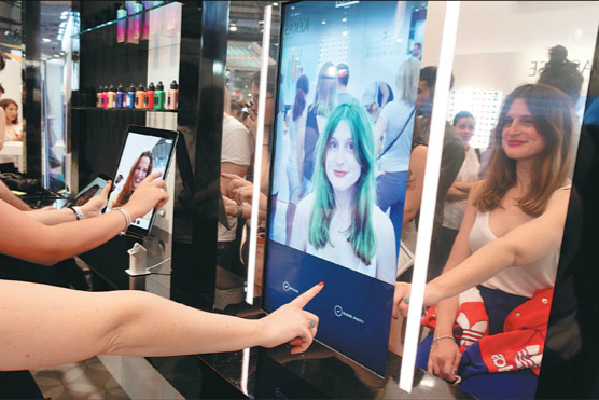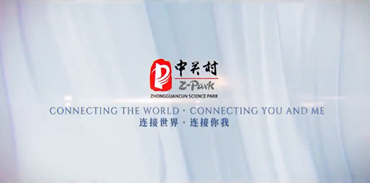Custom-made beauty
 |
|
A woman changes her hair color by using the virtual mirror at the Viva Technology Paris 2018. Photos Provided to China Daily |
The cosmetics industry is using technology to draw Chinese consumers. Chen Meiling reports.
A robot waves its arm as it applies foundation to your face. You use your phone to try different colors of lipstick. You say you want to remove some annoying pimples and a disembodied voice gives you advice and even arranges the delivery of some facial cleanser to your house.
During the third Viva Technology conference, a major global innovation and technology event held in Paris from May 24 to 26, many exhibitors showcased how the latest technologies are changing how we see ourselves and how AI, virtual reality, big data, genetics, robotics and 3D printing are being used by the cosmetics industry.
"The big problem for many customers is they don't really know what shade of foundation is right for them, what lipstick color goes with their skin tone, and how they will look with a particular hair color," says Stephane Rinderknech, CEO of L'Oreal China and executive committee member of L'Oreal Group, which has been an exhibitor at all three Viva Technology events, presenting its latest beauty tech innovations.
This year, L'Oreal demonstrated how it is applying advanced digital technologies to create "augmented" personalized services for consumers.
For instance, the company has developed a voice-enabled virtual mirror, in cooperation with Chinese technology giant Alibaba, that allows users to shop directly on Alibaba's e-commerce platform TMall for makeup products based on looks selected by the consumers while using the mirror.
With a click users can try a new lipstick. Don't like it? They can click and try another.
"Today, there's a strong trend among Chinese consumers - that is who I am, and I want to express myself," Rinderknech says.
And it is not the company's only foray in tech. L'Oreal has also sold over 1 million wearable devices that can detect real-time levels of ultraviolet. Users can upload information of their skin status on an app and it will offer a solution for protecting the skin.
"Such technologies are helping consumers satisfy their desire for beauty," Rinderknech says.
Liu Rong, supply chain and marketing vice-president of SoYoung, a cosmetic surgery social networking app, agrees.
"The application of technology in the cosmetics industry has great potential in the Chinese market as people are showing an increasing demand for self-expression," she says.
Liu says she has tried virtual makeup apps and customized styling apps, with which the service providers give a specific plan for each individual according to facial appearance, skin status and intended use.
"I felt those products were specially designed for me at that certain moment, which was very sweet," Liu says.
Domestic makeup consultancy app, Beauty Evolution, won the global innovation award at the Viva Technology, beating about 100 candidates from around the world.
Li Wei, partner of the two-year-old startup, says, "Data show more than 80 percent of our Chinese clients have previously purchased makeups that are not suitable for them. We hope that is not a problem in the future."
He explains that China is at the forefront of cosmetics tech as the cost of R&D in developed countries is about six times more.
"But the key is whether people feel they are really benefiting from the technology," he adds.
Since it entered the Chinese market in 1997, the 111-year-old L'Oreal has been introducing tailored products for the middle-class in China. Today, its skin research center in Shanghai can produce "quasihuman" skin with the skin tones of Chinese people to test the effects of makeup before it is mass produced, which also helps to avoid irritations or allergic reactions.
The company is now cooperating with domestic internet companies to get the feedback of Chinese consumers based on big data.
"China has become a global leader in technological innovation. And Chinese customers have shown a greater curiosity and better acceptance towards technology than other markets in the world," says Guive Balooch, vice-president of global innovative incubation at L'Oreal.
He expects targeted beauty solutions to see rapid development, fueled by the application of new technologies such as deep learning and AI.
So while robots may take our jobs, at least when they do, we'll be looking good.

